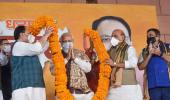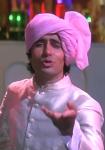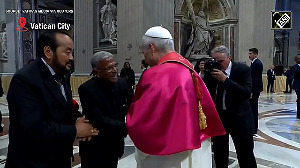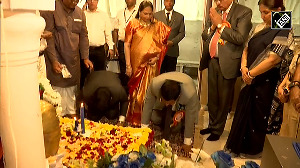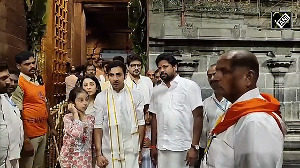'The central BJP has worked out an arrangement -- Yogi manages the state while Modi manages the Centre.'

"Uttar Pradesh has seen Congress, Bharatiya Janata Party, Bahujan Samaj Party and Samajwadi Party governments. Politically, they were different, but at the governance level they were broadly the same."
"You could talk to them. You could oppose them. The present dispensation is remarkably averse to engaging with the critiques of the government," Prashant Trivedi, professor, researcher and social analyst with special focus on Uttar Pradesh, tells Rediff.com's Archana Masih.
What do you think is the purpose and the likely impact of the UP Population Control Draft Bill?
It is premised on a wrong relationship between population growth, illiteracy, and poverty.
In fact, eradication of poverty, the spread of education, especially among women, growth in employment opportunities, and development lead to lowering of the total fertility rate.
By ensuring better health, education, employment opportunities, the 'demographic dividend' in the form of the young population could be realised.
The state must invest in ensuring better standards of living for the people of the state.
The coercive measures proposed by the state law commission in its draft bill are more likely to be counterproductive and will penalise poor, Dalit, backward, minority women.
The BJP has always tried to give a communal twist to the debate on demography. This one is not a new attempt.
How has UP changed in the last five years?
UP has seen Congress, Bharatiya Janata Party, Bahujan Samaj Party and Samajwadi Party governments. Politically, they were different but at the governance level they were broadly the same.
You could talk to them. You could oppose them. Even governments headed by Rajnath Singh and Kalyan Singh could be engaged with.
The present dispensation is remarkably averse to engaging with the critiques of the government.
They are high handed and authoritarian which is different from previous BJP governments.
Secondly, whichever government was in power -- BJP, SP or BSP -- it was the sole custodian of law and order. They tried to keep the state peaceful; the present government has been slack in this responsibility.
Some of their own legislators are known to make statements that vitiate the environment.
UP belongs to peace loving people, but now we see a lot of social tension around us. There has been a big change in the environment of the state.
Thirdly, UP has become a politically charged and polarised state. Everybody owns a political identity. Previously, there used to be very loose bonds between political parties and the common man.
People had a liking for a particular political party, but were open to weighing options in other parties as well. Now you belong to a party and hold it very close even if it performs or does not.
What do you think was the reason for the reported violence in the block panchayat chief elections? Are the assembly elections likely to witness violence as well?
After losing a huge number of seats in direct elections of the three-tier panchayat elections, the BJP used money, muscle, and state power in indirect elections of chairpersons to show that they are in control just before the state assembly elections.
This kind of open violence is unlikely in the state assembly elections under the watch of the Election Commission of India.
However, blatant misuse of money and state power cannot be ruled out.
What will be the main issues of the assembly election next year? What about the minorities?
The discourse will be channelised on development, but primarily the political identity of a person will matter the most.
Political loyalty will ensure that voting largely happens on political lines. There will be a small section of voters with floating votes.
Minorities are scared in the present environment, but as the election approaches, they too get activated. Large chunks of minority votes will go to the Samajwadi Party which is the biggest party standing up to the BJP.
Minorities also feel that the SP has not betrayed them in the recent past. But they will keep their options open at the constituency level, they will vote for a party that is pitted against the BJP.
If Yogi Adityanath wins UP handsomely, can he pose a challenge to Narendra Modi?
The way Modi has handled the rumblings against Yogi in UP, the central BJP has decided not to go against Yogi because they have worked out an arrangement -- Yogi manages the state while Modi manages the Centre.
Yogi is much more a challenge to the second rung of leadership of the BJP. He is more of a challenge to Amit Shah than Modi.
Feature Presentation: Aslam Hunani/Rediff.com
